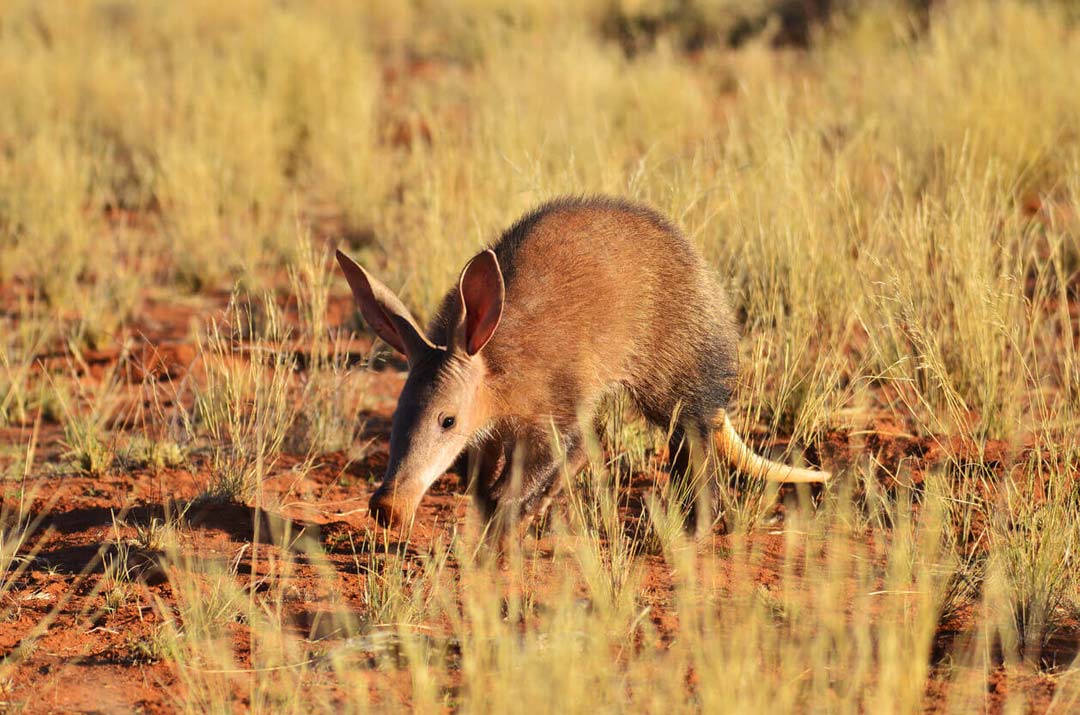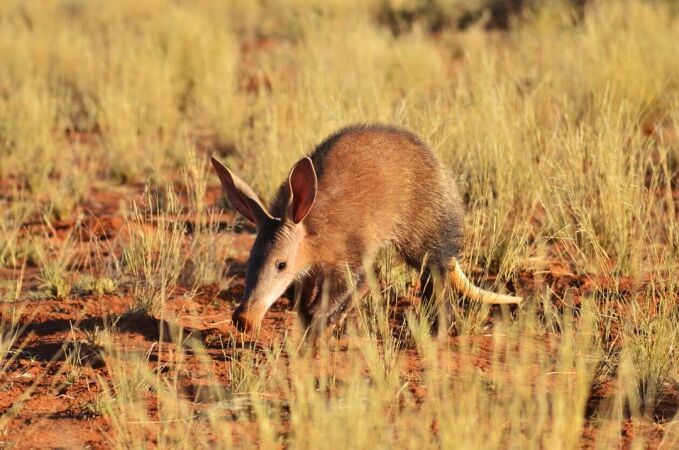

The aardvark (Orycteropus afer) is a nocturnal mammal found across sub-Saharan Africa. It is also known as the African antbear, as well as the Cape anteater. It is classified by the IUCN with a status of “least concern” and hunted throughout sub-Saharan Africa as part of specialty game hunting safaris.
The aardvark lives in a variety of habitats, including woodlands, grasslands, and savannas. It is a solitary creature that spends its days sleeping and resting underground in burrows, emerging at night to forage for termites and ants.
The aardvark will use its thick, strong claws on its front feet to dig up anthills or termite nests to get to the insects. They are very efficient diggers and can quickly dig when required, at a rate of up to 3 feet in 15 seconds! The termites and ants are slurped up using its exceptionally long sticky tongue, which can grow up to 12 inches long.
Aardvarks only come together to mate, with one cub being born between May and July in an underground burrow, after a gestation period of roughly seven months. The baby aardvark is dependent on its mother for the first few months of its life. It will start following her around after a few weeks and be fully independent by six months.
Predators of the aardvark include lions, hyenas, pythons, African wild dogs, and leopards. Man is also a major predator for the aardvark. Firstly, because it is seen as a pest for the holes that it digs, and secondly for its body parts, such as claws and teeth, used in traditional medicines as well as curios. Lastly, it is targeted on African hunts as a specialty animal and exceptionally unique game hunting trophy.
Name:
Orycteropus afer
Male Weight:
110-180 pounds
Range:
Sub-Saharan Africa
Gestation Period:
7 months
Life span:
18-23 years
The Aardvark has a long tongue, arched back, and incredible digging superpower!
Game hunting enthusiasts on African hunts targeting the aardvark should keep an eye out for a medium-sized mammal with a short neck, a largish body with an arched back, and a long tail. It has long ears, with a long, protruding snout. It is almost hairless, but the fur that it does have often matches the color of the sand or soil in the region. Cleaner members of the species are a yellowish-brown color. They stand about 24 inches at the shoulder, and up to 7 feet including their long tails, with the tail alone measuring up to 28 inches. Adult aardvarks weigh between 110-180 pounds. Aardvarks have extremely strong front claws that are used for digging. As mentioned, they are nocturnal and also don’t have very good vision. However, their excellent sense of smell and extraordinary hearing make up for what they cannot see.
Aardvarks are targeted on a nocturnal game hunting safari, using spotlights to locate the animal. This brings about a new level of excitement to game hunting adventures in Africa!
When hunting in Africa, the aardvark will be seen as a specialty animal, as it is not a member of dangerous game or plains game. They are generally targeted on a night game hunting adventure, adding even more excitement to the hunt! The challenge is to be able to get close enough to get a shot in, as this animal is extremely shy and cautious. Although it cannot see well, it has exceptional hearing and a very good sense of smell. Another challenge on these African hunts is that aardvarks can disappear before your eyes, digging holes and burrows and literally disappearing into them, in less than a minute.
A small rifle caliber such as a .22 centerfire or .243 will get the job done, one may also consider a shotgun for an aardvark game hunting safari. If the hunter is limited to a larger caliber rifle such as a .308 Winchester Magnum, 30-06 Springfield, or 300 PRC, they might want to consider using monolithic bullets. An expanding monolithic bullet will create a smaller exit wound hole when compared with lead-core projectiles, while a non-expanding monolithic will create a hole the exact diameter of the projectile. A big-bore rifle could be used, but only with the use of non-expanding monolithic bullets. The rifle should be fitted with a good quality scope which they are comfortable shooting. The use of a thicker reticle will allow for quick target acquisition and shooting in low-light conditions, or with the use of an artificial light.
Search from our range of Hunts across various popular destinations in Africa.
Find A Hunt